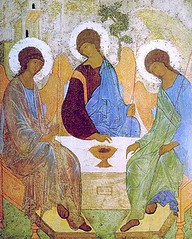The order of the articles

At last week's retreat of the Susquehanna and Chesapeake/Potomac chapters of the Society of the Holy Trinity, one of the presentations made mention of a book that is a required homiletics text at one of our Lutheran seminaries.
The book is titled "Trouble with Jesus: Christology, Feminism, and Homiletics" and advances the thesis, among others, that the trouble started when the early Christians began confusing the person of Jesus with his message.
Making disparaging comments about every single ecumenical council, the book claims that we are to use Jesus as the example and exemplar for our own efforts, that it is the quest of Messiahship that can be found in all of us. Or something like that.
The big revelation that I came to is that I've been used to thinking of the fourth article of the Augsburg Confession as the first important one. It's not. There is a reason that the first article confesses the nature of God. To the extent that we do not confess and understand God as Trinity, we are no Lutherans, no Christians.
To believe in Christ is to acknowledge the mystery of the Incarnation, to believe that, for us, God who is beyond time, space, and culture bound himself permanently to time, space, and culture.
In becoming human in Christ, the Word of God speaks God's language to us, but also speaks our language to God, representing us to God and bridging the divide of sin.
Unfortunately, this faith is being discarded as "primitive" in portions of our church. If it is not being flatly denied, it is being ignored as esoteric and divisive. It seems we have a choice, on one hand, between the bearded grandfatherly distant Deity who creates and sends us to find our way, and on the other, the Life Force within each of us, affirming each disparate, unique, and non-negotiable path.
Or is there a third way, old as Christianity itself, in our first article, affirming our creation by God; celebrating our adoption as the brothers and sisters of the Word of God who became like us in order that we might be
sons and daughters of his Father; and recognizing the Spirit that strives in us as in one sense alien and in the other transforming us to be truly ourselves in God?

0 Comments:
Post a Comment
<< Home